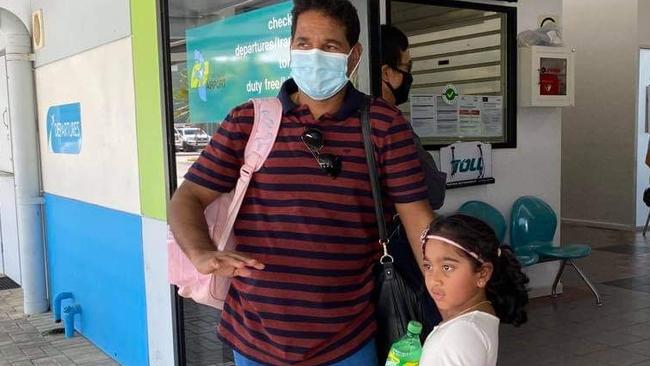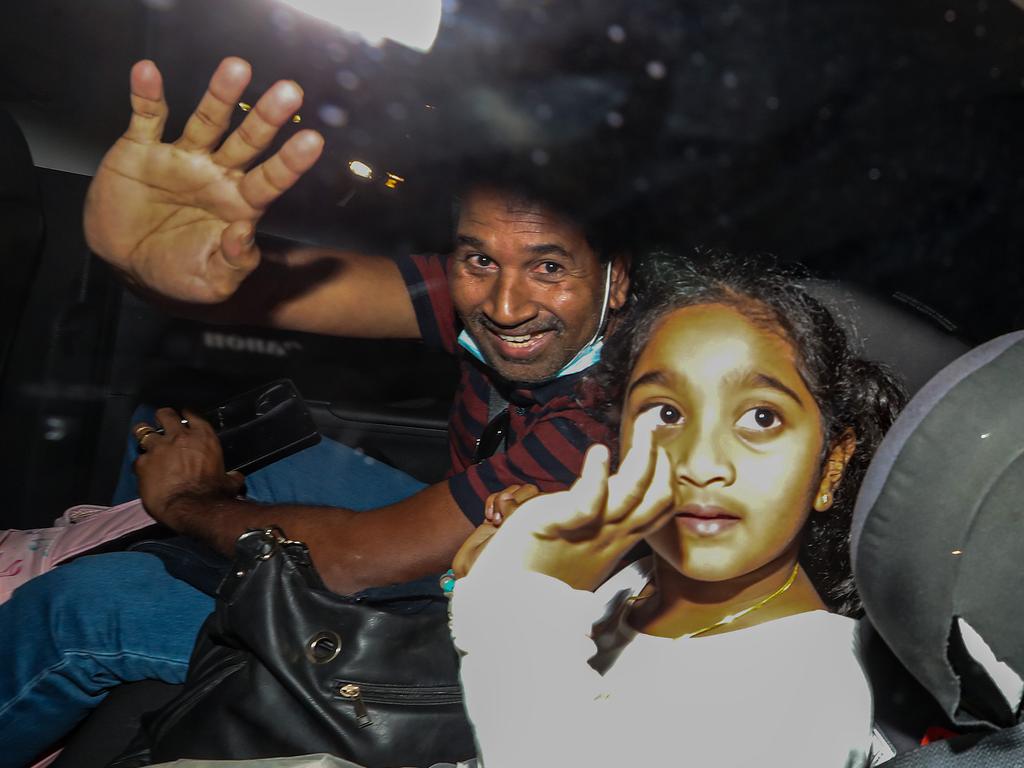
The push to grant a compassionate exception to border security rules for the “Biloela family” is one that risks undermining a regime that has led to the elimination of criminal people-smuggling exploitation, saving of lives and enabling of record levels of safe and orderly humanitarian immigration intakes (a compassionate outcome on any score).
The virtue-signalling option here is obvious and easy. Priya and Nadesalingam Murugappan seem a lovely couple who enjoy strong local support, and their daughters, Kopika, 6, and Tharnicaa, 4, were born here, so why not let them stay?
The repercussions from such a decision are bound to be unfair and could be disastrous. The unfairness — should anyone need reminding about arguments that have played out in our national debate for more than three decades — stems from people breaking the rules, taking advantage of our legal system and political advocacy to force Australia into accepting them as permanent residents, while genuine refugees, who have applied properly overseas, have their aspirations pushed back.
Over the years I have experienced this dilemma from the inside, attending all manner of meetings around the world as a staffer for then foreign minister Alexander Downer, to find ways to manage the policy issues, humanitarian consequences and diplomatic tensions. More recently, working in the media, I have gone out of my way to meet asylum seekers in order to fully inform myself, readers and viewers about the issues – in 2015, I went to considerable effort to get to Nauru to assess the way asylum seekers were being treated.
It is profoundly distressing to meet asylum seeker families and hear about their plights and hopes, knowing they will not be allowed to settle here. These are people who rightly see our country as the promised land, where they can pursue their main goal of forging a better future for themselves and their children.
That Australia could fulfil their hopes is beyond question and, on my assessment, it is easy to see most asylum seekers making terrific contributions to our national project. But that, clearly, is not the test — the test is whether they are refugees.
Considering this issue from the standpoint of what would be the best outcome for the Biloela family is a luxury policymakers cannot afford. It is the easy position to take when you shoulder no responsibility.
In theory, border protection policy is simple. We decide who will come to this country and the manner in which they will come, then we fill our generous humanitarian intake by accepting people based on need and determined by the UN to be refugees.
However, in practice we have seen time and again that implementation is diabolically difficult and requires stern resolve. The world has an endless supply of desperate people who, understandably, would do practically anything to establish a new life in this country; and, obnoxiously, there are many opportunists and criminals willing to exploit that desire along with any weakness in our border security to turn an illegal profit.
Unconstrained by law, we would see people-smugglers enriched endlessly as tens of thousands of people boarded boats to arrive on our shores every year. Thousands more would die in the attempt.
We have seen all this unfold before. Most recently, when Labor relaxed our border regime in 2008 with a “more compassionate” approach, more than 800 boats arrived over five years with more than 50,000 asylum seekers, leading to at least 1200 deaths.
This makes Labor’s championing of an exemption for the Biloela family difficult to comprehend. It often says it supports strong borders, but is yet to hold to a tough decision, indicating its home affairs spokeswoman, Kristina Keneally, has forgotten more about border security than former ministers Chris Bowen and Tony Burke ever learned.
Some Coalition politicians, including former deputy prime minister Barnaby Joyce, have joined this chorus, citing the birth of children in this country as the fact that warrants special treatment. Some have wrongly described the daughters as Australian citizens.
Still, let us imagine if birth in Australia were allowed as the crucial factor allowing this non-refugee family to remain. It would be a signal to people-smugglers to market their services for pregnant women.
At times, people-smuggling ventures have delivered mainly men, who risked the perilous journey in the hope of bringing wives and children under family reunion provisions once they won visas. Then more women and children joined the voyages because that increased the chances of a settlement. A possible incentive for pregnant women would be a grotesque development. Given Australia is so risk-averse in its pandemic management — even pausing its humanitarian refugee intake — it would seem incongruous to take any risk of reopening a tragic, costly and repugnant trade.
A contemporaneous demonstration of the power of border signals is playing out on the US-Mexico border after the election of Joe Biden. The Democrat President’s promise of a “more compassionate” approach has led to a crush of humanity and, inevitably, a dashing of hopes.
Would the success of one family after almost a decade of complex legal manoeuvres signal the end of fortress Australia? Probably not; but no one can say for certain. It would certainly demonstrate the value of persistence to others testing the government’s will through the courts. It might encourage more to marry and have children.
Transferral of the Tampa asylum-seekers to New Zealand and the more recent resettlements under the US deal have been carefully calibrated to provide a humanitarian outcome without sending a signal of softened borders. People arriving by boat have not settled in Australia.
If this Sri Lankan family are allowed to return to Biloela, there is no doubt this would show it is possible for non-refugees to arrive on our shores courtesy of people-smugglers, and stay. That would be wonderful news for one family, but policymakers must decide what it might mean for tens of thousands of other families.
Who among us could fail to have sympathy for children stuck in detention for so long? Yet the people primarily responsible for that situation are the parents who refuse to go home, preferring to test Australia’s system through constant litigation.
The family have been given the health, education and welfare support they need; our nation must never falter in that regard. But the government is clearly and rightly concerned that caving in to legal and political pressure in such a public case could create more hardship than it resolves.




A couple who separately risked their lives on people-smuggling voyages to get to Australia almost a decade ago, met and married here before having two children and settling in the regional Queensland town of Biloela, want to stay. It is at once understandable, but a fraught proposition for national border protection policy.